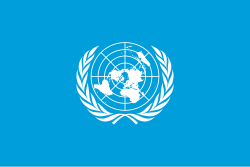
Back Еиду Амилаҭқәа Реиҿкаара Abkhazian Persjarikatan Bangsa-Bangsa ACE Дунэе Лъэпкъ Организацие ADY Verenigde Nasies Afrikaans Vereinte Nationen ALS የተባበሩት መንግሥታት ድርጅት Amharic Organización d'as Nacions Unidas AN Ġemǣnra Þēoda ANG संयुक्त राष्ट्र ANP الأمم المتحدة Arabic
 | |||||||
| Headquarters | 760 United Nations Plaza, Manhattan, New York City (international zone) | ||||||
| Official languages | |||||||
| Type | Intergovernmental organization | ||||||
| Membership | 193 member states 2 observer states | ||||||
| Leaders | |||||||
| António Guterres | |||||||
| Amina J. Mohammed | |||||||
| Philemon Yang | |||||||
| Bob Rae | |||||||
| Establishment | |||||||
• UN Charter signed | 26 June 1945 | ||||||
• Charter entered into force | 24 October 1945 | ||||||
Website un | |||||||
| |||||||
The United Nations (UN) is an intergovernmental organization established by the signing of the UN Charter on 26 June 1945 with the stated purpose of maintaining international peace and security, to develop friendly relations among states, to promote international cooperation, and to serve as a centre for harmonizing the actions of states in achieving those goals.
The United Nations headquarters is located in New York City, with several other offices located in Geneva, Nairobi, Vienna, and The Hague. The UN comprises six principal organizations: the General Assembly, the Security Council, the Economic and Social Council, the International Court of Justice, the Secretariat, and the Trusteeship Council which, together with several specialized agencies and related agencies, make up the United Nations System.
The UN has primarily focused on economic and social development, particularly in the wave of decolonization in the mid-20th century. The UN has been praised as a leader of peace and human development, with many officers and agencies having been awarded the Nobel Peace Prize, but has also been criticized for perceived ineffectiveness, bias, and corruption.
- ^ "Official Languages". United Nations. Archived from the original on 13 July 2021. Retrieved 31 December 2021.
© MMXXIII Rich X Search. We shall prevail. All rights reserved. Rich X Search

